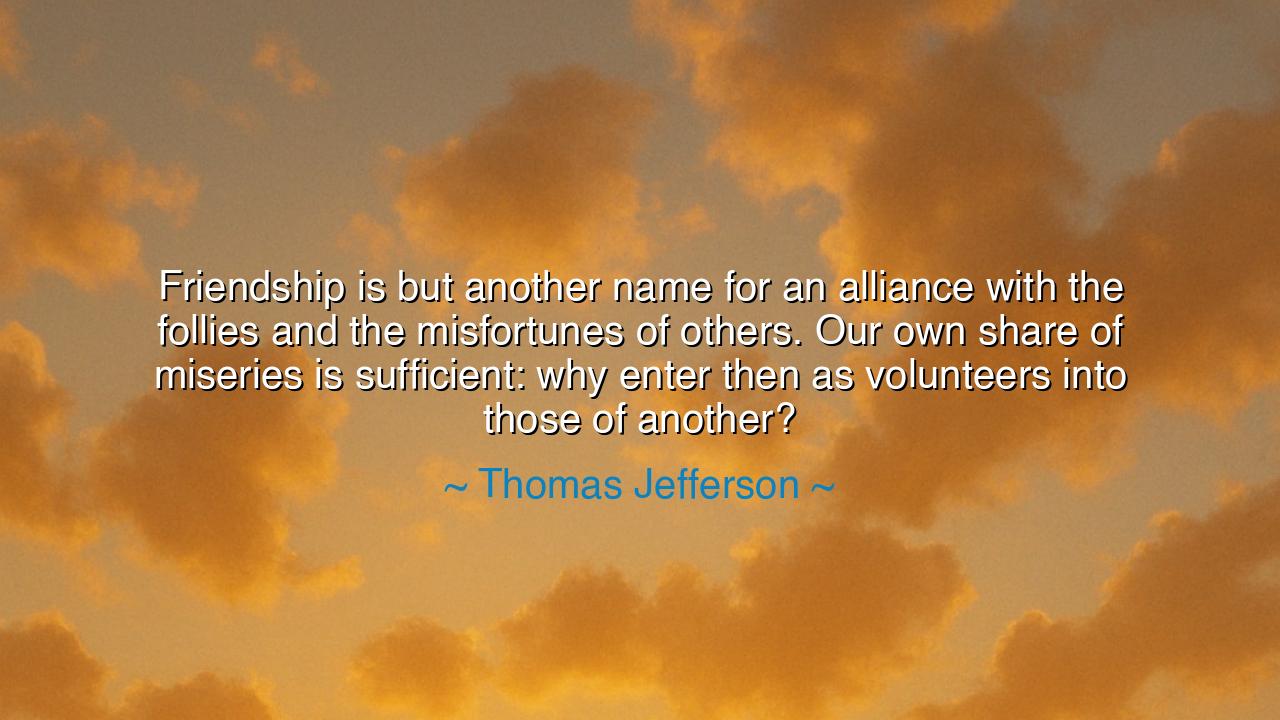
Friendship is but another name for an alliance with the follies
Friendship is but another name for an alliance with the follies and the misfortunes of others. Our own share of miseries is sufficient: why enter then as volunteers into those of another?






"Friendship is but another name for an alliance with the follies and the misfortunes of others. Our own share of miseries is sufficient: why enter then as volunteers into those of another?" These words, spoken by Thomas Jefferson, strike at the very heart of the human condition. They challenge us to consider the true nature of friendship, and whether it is merely an exchange of burdens, an alliance forged out of shared suffering. Jefferson presents a candid view, one that many may find uncomfortable but, if truly reflected upon, reveals the profound complexity of human relationships. He speaks not of the joys and victories of friendship but of its darker side—its willingness to share in the follies and misfortunes of others, the inevitability of suffering that binds people together.
In the grand tradition of ancient thinkers, the question of friendship and its burdens has been raised before. The Stoics, for example, were acutely aware of the weight of human suffering and the fleeting nature of joy. They taught that to form bonds with others was to invite both the joys and the pains of life into one’s heart. However, they cautioned against giving oneself wholly to another’s misfortunes, for in doing so, one might lose sight of their own path, their own peace. Jefferson, though not a Stoic, shared in this sentiment, reminding us that our own miseries are enough to carry. Why, then, should we voluntarily add another’s suffering to our load?
And yet, the question remains: is this view too harsh? Are we not, as humans, meant to share in the misfortunes of others, to bind ourselves in friendship with those who need us most? To this, the ancients would answer that true friendship, the kind that is enduring and meaningful, is not about simply sharing burdens, but about mutual growth and mutual support. In the story of Achilles and Patroclus, we see this beautiful and tragic bond. While Achilles was bound by duty to fight for glory, it was his friendship with Patroclus that defined him, that gave him the strength to move beyond his own suffering after the loss of his dear companion. Their friendship was not just about sharing misfortunes, but about lifting one another to greater heights, even in the face of overwhelming adversity.
Consider also the example of David and Jonathan in the Bible. Their friendship was legendary, not because they shared in the follies of each other, but because they found in each other a steadfast ally, a companion in the pursuit of a shared cause. Despite the dangers they faced, they stood side by side, supporting one another. It was their bond that helped them face miseries that would have broken lesser men. Here, we see that true friendship can indeed be a sanctuary, a source of strength, and not merely an exchange of sorrows.
Jefferson’s words do not, then, call us to abandon friendship altogether. Rather, he reminds us that friendship is a delicate balance. We must recognize the misfortunes of others, but we must also remain aware of our own. True friendship involves both compassion and boundaries, the wisdom to support others without sacrificing our own well-being. We are not meant to be consumed by the miseries of others, but to offer a hand of solidarity, one that helps lift them without being dragged into the depths ourselves. This is the great lesson of friendship: it is about standing beside, not sinking beneath.
As we live our lives, we must consider the nature of the alliances we form. Are we entering into friendships with a clear understanding of the responsibilities they entail? Are we prepared to face the misfortunes of others, not as a burden, but as an opportunity to grow and to support? And in doing so, do we retain enough strength to continue our own journey, to walk our own path? Jefferson’s reflection serves as a call for discernment. In our friendships, we must balance the weight we bear for others with the strength we need to carry our own burdens.
Let us then, dear listeners, walk wisely in our relationships. Seek friendships that lift you up, that help you grow, but also remember to guard your own heart and soul. Be a true companion in times of need, but do not let the follies and misfortunes of others become a yoke that burdens your spirit beyond what you can bear. True friendship, as the ancients understood, is a partnership not of suffering, but of strength, wisdom, and mutual respect.






AAdministratorAdministrator
Welcome, honored guests. Please leave a comment, we will respond soon